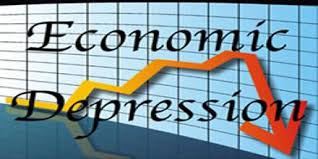Markets Daily: Welcome to the new depression

On the Main Menu: Stats SA will release economic growth statistics today, which will show an economy deep in depression. Some woke economics pundits are likely to disagree with me on calling the state of the economy to be in depression. But to be frank, the economy has been weakening for more than five years consequently.
Unemployment has been consistently rising, 30.1% as of Q1 2020 and will skyrocket past 35% in Q2 2020 if we take the Bloomberg consensus expectations, and past 40% if little is done too late. The expanded unemployment rate - that which includes those that have given up looking for work - is already at 42% as of Q1 2020 and will likely go past 50% in the coming quarters.
Poverty has been rising and the low-income earners have seen their standard of life declining. We have been in recession for a long time, technical since Q4 2019. So we have gone past the technicalities of a recession. This is depression and it shows in the standard of lives of an increasing number of people.
Back to GDP statistics. Bloomberg consensus expectations for Q2 2020 GDP growth is a whopping 47.2% contraction on a quarter on quarter and annualised basis. To put it into perspective, that is equivalent to R459bn rand decline in the economy (on an annualised basis) since the first quarter of this year. Compared with the second quarter of 2019, consensus expectations are for GDP to contract by 16% or R492bn.
This is almost the size of the R500bn fiscal package that was announced by National Treasury, so we can essentially say this fiscal package will merely offset the Q2 2020 Covid-19 economic hole. What this means is that the fiscal package is not a recovery package, it’s a replacement or maintenance package; a recovery will require more stimulus. In any case, much of the R200bn that comes through the credit guarantee scheme has not yet been distributed and the longer it takes the deeper the damage to the economy and the slower the recovery.
Who I am reading:
It is good practice to deeply engage with those who hold different ideas. A good practice that I picked up from Mohamed El Erian – the star investment guru at Alliance – is to engage with at least one solid analyst that hold a different idea on a subject matter, not so much to persuade them of my view, but to listen to their thought process and stress test my view. Following this, I have picked up Stephanie Kelton’s book - The Deficit Myth. It’s all about the ideas of Modern Monetary Theory.
While you were sleeping:
· Bond yields are mixed in Europe: German 2Y (-0.1bp), 10Y (+0.9bp); Italy 2Y(+2.7bp), 10Y (+3.0bp); UK 2Y (-1.5bp), 10Y (-1.5bp)
· Global equities are up: MSCI ACWI (+0.4%), MSCI World (+0.3%)
· US markets were closed yesterday for Labour Day.
· European markets are up: MSCI Europe (+1.6%), Euro stoxx (+1.7%), UK FTSE 100 (+2.4%), France CAC 40 (+2.0%), German DAX (+1.8%)
· Asian markets are down: MSCI Asia Pacific (-1.3%), China Shanghai composite (-1.9%), India Nifty (+0.2%), Japan topix (-0.4%) and Hong Kong Hang Seng (-0.4%).
· Latin America markets are up: Brazil (-0.1%), Mexico (+0.7%) and Chile (+2.6%).
· JSE is up 1.0%: Top40 (+0.9%), Large cap (+1.0%), mid cap (+0.7%), small cap (+1.6%), basic materials (+2.3%), mining (+2.4%), gold mining (2.9%), platinum and precious metals (+3.4%), industrials (+0.1%), general industrials (-0.6%)
· Commodities are down: Brent crude oil (-1.5%), gold (-0.1%), copper (+0.3%)
· Sovereign risk as measured by credit default swaps spreads (CDS) was mostly flat across emerging markets.
· In currency markets, the US dollar index (DXY) is marginally up by 0.4% while other majors are flat.
Data today:
· The depressing GDP figures, expected to have contracted by 47.2% q/q on a seasonally adjusted and annualised basis. That’s R459bn contraction (annualised) compared with 1Q 2020 and R492bn contraction compared to the Q2 2019 GDP.
Best regards
Isaah

Kulani Siweya (23:09:58 - September 7th, 2020)
Love the “who I am reading” segment. 👌🏾
Gerson Kadhikwa (03:09:10 - September 8th, 2020)
A very depressing read but very close to reality. Most economies in SACU are in the same situation and have applied to the IMF for the RFI and other forms of soft loans. Going forward, sovereigns should live within their means and accumulate buffers for a rainy day in the form of stabilization and sovereign wealth funds. The 2008/09 GFC is a case in point that found some SACU and SADC governments in a fiscal surplus position.
Themba Silinda (05:09:12 - September 8th, 2020)
Thanks for the update, Isaah. I have also just picked up The Deficit Myth, can’t wait to delve into it.